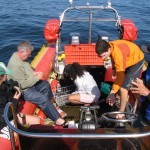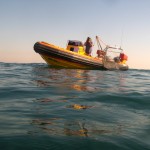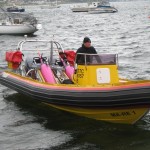Book a MARiS venue
The MARiS centre has two bookable venues located on the 4th Floor of the John Day Building that can be booked via the UCT Resource Booking system. Enter your UCT credentials and select the option of "MARiS: Book a Departmental Venue" > Select your preferred venue.
These venues are:
- MARiS Boardroom (Rm.4.03.1, capacity of 10 pax)
- MARiS Interactive Hub (Rm.4.03.11, capacity of 8 pax)
Research Vessel I
The Ma-Re research boat is a 7.3m Gemini semi-rigid inflatable vessel is powered by two 90hp outboards and has removable dive racks, which make it suitable for both SCUBA and surface diving. It also comes with a stainless steel gantry, providing a platform for the deployment of oceanographic equipment, nets etc. Ma-Re 1 has navigational equipment and is licensed for 10 people, offering sufficient capacity for student field trips.



It is available for hire internally for R1200/day and R2000/day for external charter excluding fuel, tow vehicle. External rental must include a UCT employee skipper (for insurance purposes) at an additional R800/day.
Please download the MARIS Boat Operational Guidelines here for more information.
To book the boat, please contact the UCT Research Dive Unit Manager, Pieter Truter.
UCT Marine Biogeochemistry Lab Facilities
The UCT-MBL is housed in the Oceanography Department at the University of Cape Town. Its facilities are central to work ongoing in the Altieri and Fawcett research groups, which focus on atmospheric and oceanic biogeochemistry, respectively. Many of the analytical techniques available in the UCT-MBL are for measuring components of the nitrogen cycle, the study of which is fundamental to understanding how our planet works. Nitrogen concentration measurements, while fairly simple, are inadequate for addressing many nitrogen-cycle questions because small changes are difficult to discern above background levels, and once a nitrogen species has been transformed, it is impossible to deduce its origin. They overcome these limitations by measuring isotope ratios, which record both nitrogen source and the various processes acting upon it with a high degree of sensitivity. Here is a list of some of the equipment available to use (the cost depends on the types of samples):
Thermo Scientific DELTA V Plus Isotope Ratio Mass Spectrometer (IRMS)
Nutrient Laboratory
Ambient Ion Monitor-Ion Chromatograph
TOC/TN Analyzer
NOx Analyzer ("NOxBox")
For more information, please see further details on the UCT-MBL website or you can contact the UCT-MBL Lab Manager, Hazel Little-Leighton (hazel.little-leighton@uct.ac.za).
SAPRI Polar Lab
Coming Soon - see more information here: https://www.sapri.ac.za/polar-lab/.
The Polar Lab will support polar research activities across science and engineering disciplines and allow personnel to undertake research that is currently not possible in the country and the continent.
These include:
- Artificial sea ice creation in a wave tank
- Study of wave-ice interactions and damping of pancake ice and interstitial frazil ice
- Study of biological uptake, production and gas exchanges in natural and artificially created sea ice
- Study of atmosphere-ice-ocean interaction in artificially created sea ice
- Sub-zero testing and analysis of physical, mechanical and biogeochemical properties of Antarctic and artificial sea ice samples
- Sub-zero testing and analysis of physical and mechanical properties of Antarctic geological samples
- Near-zero and sub-zero experiments with biological specimens from the polar ocean, sub-Antarctic islands and the Antarctic continent
You can also contact the SAPRI Polar Lab Research Coordinator, Riesna Audh via email at rr.audh@saeon.nrf.ac.za or the SAPRI Polar Lab User Fora Chair, Prof Marcello Vichi via email at marcello.vichi@uct.ac.za.
Grab – Sampling Equipment
Information will be forthcoming.
Video Conferencing Equipment
Information will be forthcoming